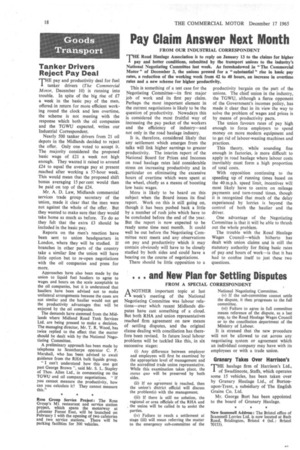Pay Claim Answer Next Month
Page 20

If you've noticed an error in this article please click here to report it so we can fix it.
FROM OUR INDUSTRIAL CORRESPONDENT
TlRoad Haulage Association is to reply on January 13 to the claims for higher iTy and better conditions, submitted by the transport unions to the industry's National Negotiating Committee last week. As foreshadowed In "The Commercial Motor" of December 3, the unions pressed for a " substantial " rise in basic pay rates, a reduction of the working week from 42 to 40 hours, an increase in overtime rates and a new scheme for higher productivity.
This is something of a test case for the Negotiating Committee—its first major job of work and its first pay claim. Perhaps the most important element in the current negotiations is likely to be the question of productivity. Nowadays this is considered the most fruitful way of increasing the pay packet of the workers and the efficiency of industry—and not only in the road haulage industry.
It is, therefore, considered likely that any settlement which emerges from the talks will link higher earnings to greater productivity. The interim report of the National Board for Prices and Incomes on road haulage rates laid considerable stress on increasing productivity and in particular on eliminating the excessive hours of overtime which were spent at the wheel, chiefly as a means of boosting low basic wages.
More is likely to be heard on this subject when the Board issues its final report. Work on this is still going on, though it has been pushed back a little by a number of rush jobs which have to be concluded before the end of the year. But the report is now expected to be ready some time next month. It could well be out before the Negotiating Committee next meets and any observations on pay and productivity which it may contain obviously will have to be closely studied by both sides and could have a bearing on the course of negotiations.
There should be little opposition to a productivity bargain on the part of the unions. The chief union in the industry, the TGWU, although a fierce opponent of the Government's incomes policy, has made it clear that in its view the way to solve the problem of wages and prices is by means of productivity pacts.
The union favours rates of pay high enough to force employers to spend money on more modern equipment and to get rid of labour-wasting machines and practices.
This theory, while sounding fine enough in factories, is more difficult to apply in road haulage where labour costs inevitably must form a high proportion of total costs.
With opposition continuing to the speeding up of running times based on the 40 m.p.h. speed limit, incentives will most likely have to centre on mileage payments and turn-round times, though it is recognized that much of the delay experienced by lorries is beyond the control of both the haulier and the driver.
One advantage of the Negotiating Committee is that it will be able to thrash out the whole problem. The trouble with the Road Haulage Wages Council—which hitherto has dealt with union claims and is still the statutory authority for fixing basic rates of pay and hours of work—is that it has had to confine itself to just these two questions.












































































































